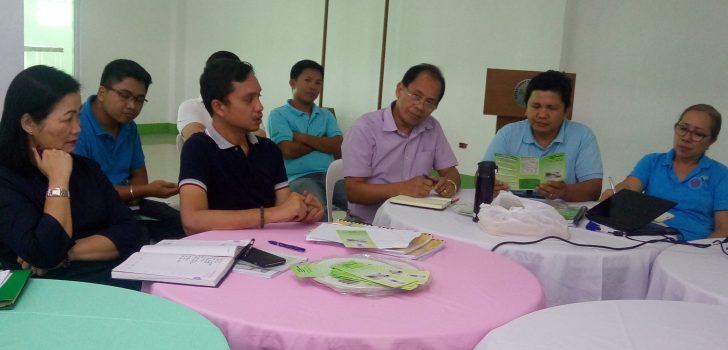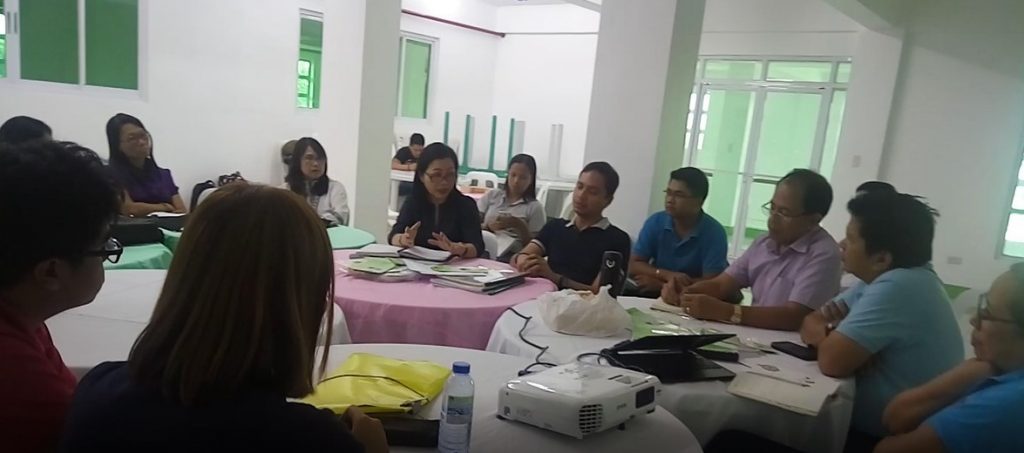 PRDP South Luzon PSO Director Shandy Hubilla (3rd from left) provides updates about the Pilot Testing of the Village Level Coconut Water Processing System project and expresses his hope that since it was launched and tested in Bicol, Bicolanos would also benefit from the technology. (Photo by Annielyn L. Baleza, DA-PRDP RPCO V InfoACE Unit)
PRDP South Luzon PSO Director Shandy Hubilla (3rd from left) provides updates about the Pilot Testing of the Village Level Coconut Water Processing System project and expresses his hope that since it was launched and tested in Bicol, Bicolanos would also benefit from the technology. (Photo by Annielyn L. Baleza, DA-PRDP RPCO V InfoACE Unit) PRDP, DA-Bicol, PhilMech to upgrade coco water processing facility
The Philippine Rural Development Project (PRDP) in Bicol plans to upgrade the existing coco water facility based at the Department of Agriculture (DA) Compound in Pili, Camarines Sur to a coco hub, combining coco water production with copra and virgin coconut oil (VCO) processing.
During a stakeholders’ meeting on March 28, DA-Bicol Regional Executive Director and PRDP-Bicol Project Director Elena de los Santos shared her plan to upgrade the existing coco water facility into a business incubation facility for coco water and VCO before transferring the technology to the coconut farmers.
The said meeting was attended by Director Arnel Ramir Apaga and Dr. Ofero Capariño of the Philippine Center for Postharvest Mechanization and Development (PhilMech), PRDP South Luzon Project Support Office (PSO) Director Shandy Hubilla and project partners from the Provincial Local Government Unit (PLGU) of Camarines Sur and Central Bicol State University of Agriculture (CBSUA).
“We will conduct final fine-tuning of the technology and operation of the facility (in DA) so that when we transfer the operation to an organization it will be an income-generating enterprise of the proponent group. The facility and technology that we will transfer to the farmer organization will be comprehensive and perfected along coco water, VCO, and other coconut by-products production,” de los Santos said.
In the next three to six months, de los Santos stressed that the upgrading efforts should target to enhance the coco water’s shelf-life and reduce production cost/unit cost of product as well as the overall production performance of facility. She added that once perfected, identified farmer organizations will be provided with a separate facility, funding of which will be generated from other sources.

DA RFO V Regional Executive Director and PRDP-Bicol Project Director Elena de los Santos (center, in navy blue) shares her plan to fine-tune the coco water processing technology and operation of the facility prior to full commercialization and adoption by a farmers’ organization. (Photo by Annielyn L. Baleza, DA-PRDP RPCO V InfoACE Unit)
Meanwhile, the coco water facility cum coco hub facility in DA-Bicol will serve as a training ground for farmer organizations in Bicol and other regions who are interested to venture in the production of coco water, VCO, and other coco products. At present, the Coco Water Processing Technology Pilot Testing and Business Incubation Facility at the DA Compound has small equipment for VCO processing. However, according to Dr. Capariño, PhilMech Chief Science Research Specialist and Division Chief, it cannot cater to the number of coconuts to be generated from coco water production. Thus, an additional area for VCO production will be established and processing equipment will be procured for the upgrading of the facility. Funding for such will be jointly shared by PhilMech and DA-Bicol. Meanwhile, the PRDP South Luzon PSO will download P1 million for the operational expenses in addition to the P1.53 million PRDP-Bicol fund allotted for the Pilot Testing of the Village Level Coconut Water Processing System.
Capariño said that this pilot subproject in Bicol now serves as PhilMech’s actual model and allows them to showcase its actual operation. Consequently, the “Be Cool” coco water produced at the Coco Water Processing Technology Pilot Testing and Business Incubation Facility is also being promoted.
PhilMech also currently assists in the VCO and coco water production project in Pantukan, Compostela Valley co-funded by the Bureau of Agricultural Research and a similar project in Kidapawan City, North Cotabato to be co-funded by the Philippine Coconut Authority. Dr. Capariño added that both facilities will have some modifications as they will adopt the recommendations based on the results of the Pilot Testing of the Village Level Coconut Water Processing System in Bicol, particularly the washing and filling systems.
Capariño assured that the PhilMech will continue to provide all the technical support as DA and PRDP-Bicol integrates VCO production in its coco water processing system facility.
This Pilot Testing of the Village Level Coconut Water Processing System project was launched in Bicol on February 11, 2015 as a collaboration among DA-PRDP, DA-PhilMech, DA-Bicol, PLGU-Camarines Sur and CBSUA to pilot test coco water’s market acceptability, profitability, product characteristics and machine efficiency prior to full commercial adoption.
“Since the coco water processing technology was launched and tested in Bicol, we hope that Bicolanos would also benefit from this technology,” Hubilla said.
Bureau of Agricultural Statistics (BAS) data in 2013 shows that Bicol has 453,501 hectares of coconut area with 1,240,458.84 metric tons volume of production.
“Considering that over 50 percent of our agricultural area is planted to coconut, kung mag-materialize na ito pag nadala natin s’ya sa farmer level, magkakaroon ng additional value and additional income ang mga coconut farmers dito sa Bicol (Considering that over 50 percent of our agricultural area is planted to coconut, if this project would materialize and we are able to take this to the farmers’ level, it will generate additional value and additional income to the coconut farmers here in Bicol),” de los Santos added. ### (Annielyn L. Baleza, DA-PRDP RPCO V InfoACE Unit)
